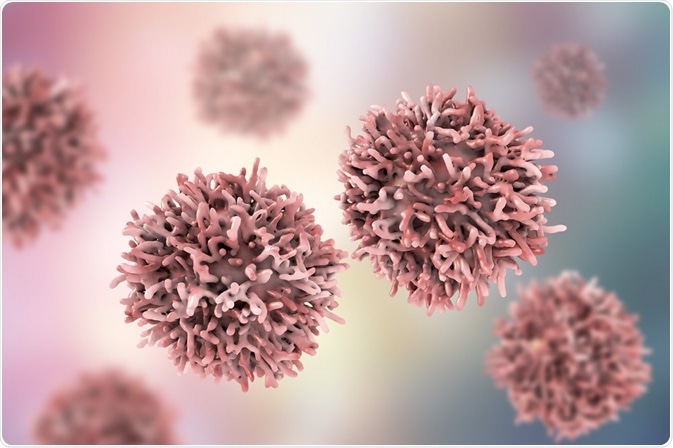
Ras Genes and Cancer
Ras genes encode proteins that can cause cancer (or become oncogenic) when mutated. All Ras proteins are GTPases which act as molecular switches in the cell, regulating signaling pathways and other interactions.

Image Credit: Kateryna Kon/Shutterstock.com
There are three Ras proteins, which are ubiquitously expressed in the body. These genes are; H-ras, K-ras, and N-ras. These genes participate in the Ras-Raf-MAPK pathway that is involved in critical life processes of cells.
Ras proteins are normally tightly regulated by factors that switch off the GTPase activity. Ras GTPase family proteins have a role in a number of processes including cell cycle progression, growth, migration, cytoskeletal changes, apoptosis, and senescence.
Ras mutations
When Ras function is not properly regulated, hyper-proliferation can occur resulting in developmental disorders and cancer. Specific mutations at codons 12, 13, or 61 in the Ras genes is associated with tumors.
Those mutations favor constitutive activation of Ras, meaning that the gene is always “turned on,” and there is overproduction of the protein. The mutation also increases GTP binding, leading to overactivity.
Certain germline mutations in Ras and other members of the Ras-MAPK pathway lead to constitutive activation of the pathway, but to a lesser extent than that found in tumors. These types of mutations are linked to some developmental syndromes.
The neurofibromatosis 1 (NF1) gene codes for a Ras GTPase activating protein that causes neurofibromatosis type 1. Other members of the Ras pathway have been connected to syndromes like Noonan, Costello, cardiofaciocutaneous, Legius, and Leopard syndromes. Ras activation can also contribute to other diseases like non-obese diabetes and diabetic retinopathy.
Ras mutations in cancer
Mutations of H-ras, N-ras, and K-ras are very common events triggering the development of tumors. Up to 30 percent of all human tumors screened have a ras mutation. They are most commonly found in the K-ras locus, at about 25-30 percent of all tumor samples.
N-ras mutations are found in about 8 percent of tumors, and only about 3 percent have H-rasmutations. Studies in knockout mice have shown that N-ras and H-ras are dispensable in terms of physiological relevance, but K-ras is required for normal mouse development. This supports the theory that K-ras is more significant in the development of cancer.
Some cancers in which ras mutations are frequently found include:
Pancreatic ductal adenocarcinoma
Pancreatic adenocarcinomas are some of the most frequently detected tumors and among the most aggressive with worst outcomes. They also have the highest incidence of ras mutations of all human cancers. A majority of those mutations are in K-ras at codon 12. It is believed that K-ras mutations occur very early in the development of pancreatic cancer. Even samples from patients with chronic pancreatitis show a high rate of K-rasmutations.
Colorectal carcinoma
K-ras mutations are found in 40-45 percent of all colorectal carcinoma samples. Most of those mutations affect codons 12 and 13. As in the case of pancreatic adenocarcinoma, K-ras mutations are believed to occur early in the course of disease. Some studies have shown a correlation between K-ras mutations and poor prognosis.
Non-small cell lung carcinoma (NSCLC)
K-ras mutations account for 16-40 percent of tumor samples. These mutations are believed to have a causative role in the NSCLC. These may be early events in the course of the disease and may arise on long-term exposure to chemicals like tobacco, asbestos, and coal.
Hematopoietic malignancies
Ras mutations are relatively less common in blood cancers. In chronic myeloid leukemia, the rate of ras mutations is as low as 5 percent. Chronic myelomonocytic leukemia has a rate of ras mutation of about 27 percent, though some studies have reported as high as 70 percent. Most of these mutations are in N-ras, largely on codon 61. There is no clear correlation between ras mutations and prognosis in hematopoietic malignancies.
Sources:
- A comprehensive survey of Ras mutations in cancer.
- Most human carcinomas of the exocrine pancreas contain mutant c-K-ras genes.
- COSMIC: mining complete cancer genomes in the Catalogue of Somatic Mutations in Cancer.
- Frequency of KRAS, BRAF, and NRAS mutations in colorectal cancer.
- High frequency of K-ras mutations in sporadic colorectal adenomas.
- Prognostic significance of K-ras codon 12 mutations in patients with resected stage I and II non-small-cell lung cancer.
- Targeting the Ras signaling pathway: a rational, mechanism-based treatment for hematologic malignancies?
Further Reading
Last Updated: May 22, 2018























.png)











No hay comentarios:
Publicar un comentario